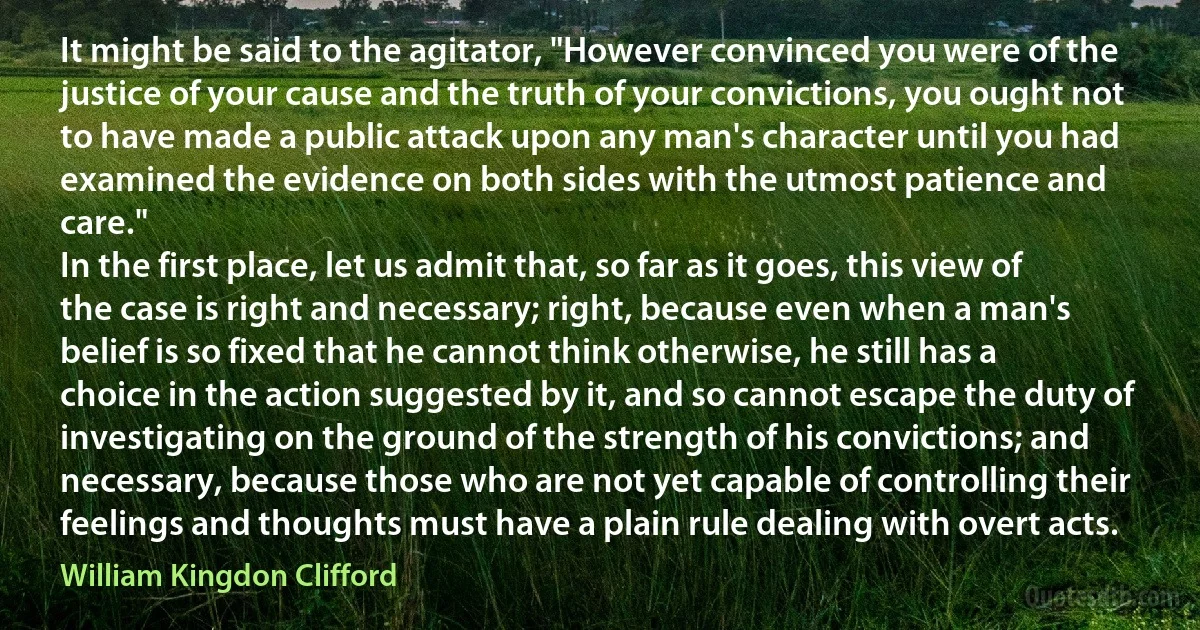
It might be said to the agitator, "However convinced you were of the justice of your cause and the truth of your convictions, you ought not to have made a public attack upon any man's character until you had examined the evidence on both sides with the utmost patience and care." In the first place, let us admit that, so far as it goes, this view of the case is right and necessary; right, because even when a man's belief is so fixed that he cannot think otherwise, he still has a choice in the action suggested by it, and so cannot escape the duty of investigating on the ground of the strength of his convictions; and necessary, because those who are not yet capable of controlling their feelings and thoughts must have a plain rule dealing with overt acts.
William Kingdon CliffordRelated topics
action agitator attack care case cause character choice controlling duty escape far ground justice might necessary ought patience place plain public right rule say strength think truth utmost view yet actsRelated quotes
We can not... escape the conclusion that the rule of reasoning by recurrence is irreducible to the principle of contradiction. ...Neither can this rule come to us from experience... This rule, inaccessible to analytic demonstration and to experience, is the veritable type of the synthetic a priori judgment. On the other hand, we can not think of seeing in it a convention, as in some of the postulates of geometry. ...it is only the affirmation of the power of the mind which knows itself capable of conceiving the indefinite repetition of the same act when once this act is possible. The mind has a direct intuition of this power, and experience can only give occasion for using it and thereby becoming conscious of it.

Henri Poincaré
Being an incomplete female, the male spends his life attempting to complete himself, become female. He attempts to do this by constantly seeking out, fraternizing with and trying to live through and fuse with the female and by claiming as his own all female characteristics - emotional strength and independence, forcefulness, dynamism, decisiveness, coolness, objectivity, assertiveness, courage, integrity, vitality, intensity, depth of character, grooviness, etc. - and projecting onto women all male traits - vanity, frivolity, triviality, weakness, etc. It should be said, though, that the male has one glaring area of superiority over the female - public relations. He has done a brilliant job of convincing millions of women that men are women and women are men.

Valerie Solanas
The Philosopher of this age is not a Socrates, a Plato, a Hooker, or Taylor, who inculcates on men the necessity and infinite worth of moral goodness, the great truth that our happiness depends on the mind which is within us, and not on the circumstances which are without us; but a Smith, a De Lolme, a Bentham, who chiefly inculcates the reverse of this,-that our happiness depends entirely on external circumstances; nay, that the strength and dignity of the mind within us is itself the creature and consequence of these. Were the laws, the government, in good order, all were well with us; the rest would care for itself! Dissentients from this opinion, expressed or implied, are now rarely to be met with; widely and angrily as men differ in its application, the principle is admitted by all.

Thomas Carlyle
I said that to invite minds to concern themselves with Mind and its destiny was a sign and symptom of the times. Would that idea have occurred to me, had not a whole body of impressions been sufficiently significant and powerful to reflect themselves in me, and for that reflection to become action? And that action, which consists of expressing it in your presence, would not perhaps have been accomplished had I not felt that my impressions were those of many other people, that the sensation of a diminution of mind, of a menace to culture, of a twilight of the most pure gods was a sensation which imposed itself with increasing strength on all those who are capable of feeling something in the order of superior values of which we are speaking.

Paul Valéry
This is a reality that our investigators repeatedly encountered in their interviews of police and city officials, their conversations with local residents, and their review of thousands of pages of records and documents. This evidence pointed to an unfortunate and unsustainable situation that has not only severely damaged relationships between law enforcement and members of the community, but made professional policing vastly more difficult – and unnecessarily placed officers at increased risk. And today – now that our investigation has reached its conclusion – it is time for Ferguson's leaders to take immediate, wholesale and structural corrective action. Let me be clear: the United States Department of Justice reserves all its rights and abilities to force compliance and implement basic change.

Eric Holder
